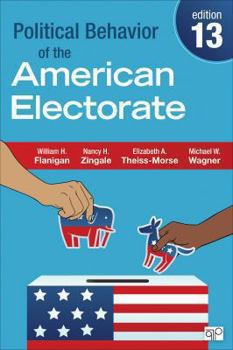Political Behavior of the American Electorate
Select Format
Select Condition 
Book Overview
The 2012 elections took place in a time of intense party polarization and a weak economy, yet the incumbent president won reelection. How did Obama pull off his victory? New authors Elizabeth Theiss-Morse and Michael Wagner continue the tradition of Flanigan and Zingale by using American National Election Study data to provide a thorough analysis of the 2012 elections and of American political behavior more generally. The authors explore get-out-the-vote efforts and the reasons people voted the way they did, as well as the nature and impact of partisanship, issues, and news media coverage in 2012--all with an eye toward understanding the trends that led up to the election.
Format:Paperback
Language:English
ISBN:1452240442
ISBN13:9781452240442
Release Date:February 2014
Publisher:CQ Press
Length:336 Pages
Weight:0.55 lbs.
Dimensions:0.7" x 6.0" x 9.0"
Customer Reviews
2 ratings
Political Behavior of the American Electorate
Published by Thriftbooks.com User , 16 years ago
Political Behavior of the American Electorate This book is great for use as a textbook in undergraduate or masters level political science class. The authors use survey data of voters and research from others to explain voter behavior, political parties, and the cyclical political shifts that occur in United States elections.
misunderstading the point
Published by Thriftbooks.com User , 20 years ago
OK, the previous reviews are clearly misunderstanding the purpose of such a book. This is essentially a simplified overview of research in political behavior. It's simple, readable, straight forward, etc. Social scientists seek to investigate phenomena that might seem "common sense" in order to find evidence for or against these conclusions. The charts and graphs don't all match because they are derived from different studies, and pulled together here. This is not original research, it is a quick, concise summary of other research - which is useful for students.






